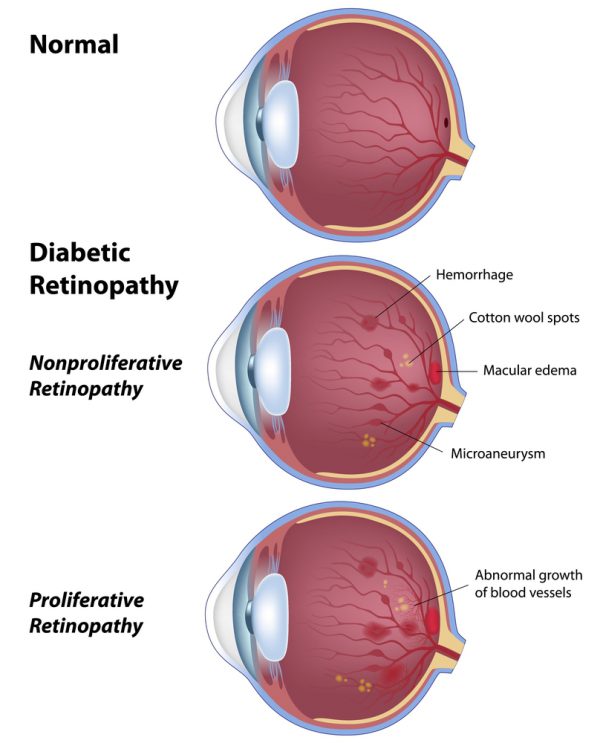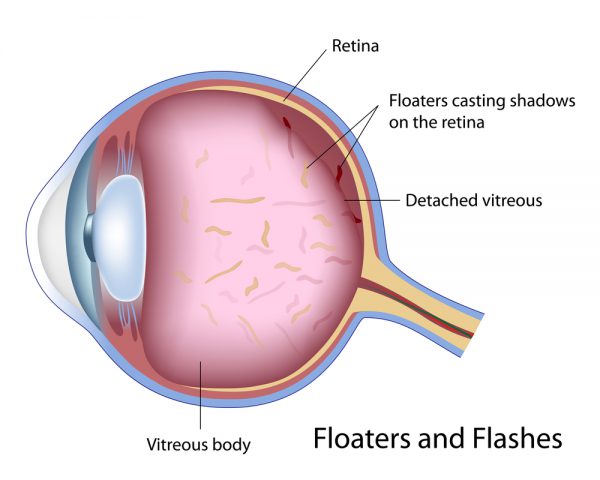Specialty Eye Conditions and Treatments
Many common eye conditions can cause serious damage to your vision, even blindness, if left untreated. Our experienced ophthalmologists at Riverside EyeCare Professionals offer treatment for a range of eye conditions and diseases that can help you prevent significant vision loss. In addition, Dr. Michael Sumsion and Dr. Sean Sumsion offer procedures designed to rejuvenate the areas around your eyes for a more youthful and refreshed appearance.
- Diabetic Retinopathy
- Glaucoma
- Macular Degeneration
- Astigmatism
- Monovision
- Dry Eye
- Flashes & Floaters
- Corneal Transplants
- Eyelid Surgery
For more information on eye conditions, treatment options, and cosmetic enhancement procedures for the eyes available at our practice, please contact us today.
Diabetic Retinopathy
Diabetic retinopathy is an eye condition which affects a large majority of people who have diabetes. Caused by the effect of diabetes on blood vessels in the eyes, diabetic retinopathy ultimately causes scar tissue to grow on blood vessels in the front part of the retina. As the condition advances, new blood vessels grow in the retina and may begin to bleed. This can ultimately affect your vision and potentially lead to glaucoma, cataracts, retinal detachment, and blindness.
The beginning stages of diabetic retinopathy often display no symptoms; however, there are signals to watch out for. These include:
- Floaters (small spots or clouds in your vision)
- Double vision
- Problems reading or seeing things clearly when they are close to the eyes
It is very important to have your vision checked on a regular basis in order to detect diabetic retinopathy at its earliest stage. The risk of developing the condition can be reduced by keeping good control over your blood sugar levels, maintaining a healthy diet and exercise regimen, and monitoring your blood pressure.

Glaucoma
Glaucoma is an eye condition characterized by increased fluid pressure within the eye. As pressure builds, the optic nerve becomes damaged and vision is increasingly impaired. Without treatment, glaucoma can lead to blindness. At Riverside EyeCare Professionals we offer diagnostic testing for glaucoma along with a variety of effective treatments designed to relieve intraocular pressure.
Macular Degeneration
Macular degeneration is an eye condition in which the eye’s macula gradually breaks down. The macula is located near the retina and allows you to see fine details, textures, and colors. As macular degeneration progresses, vision damage is inevitable—this condition is one of the leading causes of vision impairment and blindness in individuals over 50. With early detection and treatment of macular degeneration, serious vision damage can be prevented. We offer diagnostic testing and a variety of treatments for macular degeneration to help slow progression of the condition and preserve vision.
Astigmatism (LRI’s, Toric Lenses)
Astigmatism is a common eye condition that can cause the vision to appear blurry or distorted. Our ophthalmologists offer a range of treatment options for astigmatism, including toric intraocular lens implants to help improve your vision without the need for corrective eyewear.
Monovision
Monovision treatments, including LASIK and intraocular lens options, offer patients the chance to improve different distance vision issues in each eye, such as farsightedness in one eye and near-sightedness in the other.
Dry Eye
If you are experiencing itching, burning, or excessive tearing in the eye, you may have Dry Eye Syndrome. This condition is very common, and is typically caused by a problem with how the eye is producing tears. The production and drainage of tears is crucial to maintaining healthy eyes, helping to keep them moisturized and protected against eye infection, as well as facilitating the healing process if the eye has been wounded. Dry Eye Syndrome can often be brought on by pollutants in the air such as cigarette smoke; overuse of contact lenses; being exposed to a dusty or windy environment; the natural aging process; and even certain medications.
There are treatments that can relieve the symptoms of Dry Eye Syndrome, and what’s best for your needs will depend on the type of the condition you are experiencing: water-deficient Dry Eye Syndrome or oil-deficient Dry Eye Syndrome. Medicinal eye drops can often be very effective. If that is not an option, a procedure known as punctal occlusion can be performed to help the eyes produce a more regulated flow of tears. We also offer OptiLight and LipiFlow® dry eye treatment, which is are non-surgical procedures that can help remove blockages in the meibomian glands and stimulate oil production.
OptiLight – Learn More
LipiFlow – Learn More
Flashes & Floaters
Flashes or streaks of light in your vision can occur when the vitreous gel in your eye pulls or rubs the retina. They can also be symptomatic of migraine headaches or a spasm of blood vessels. Floaters are typically characterized by small clouds or dots moving across your field of vision. They can also look like lines, specks, or cobwebs, and they usually become very noticeable when looking at a blank background, such as the sky, wall, or ceiling. Floaters appear to be in front of your eye; however, they are actually inside the vitreous gel that’s present on the inside of the eye. When light hits the eye and ultimately makes contact with the floaters, you are seeing the shadow that is cast on the retina.

Flashes and floaters can sometimes be the process of natural aging as the vitreous gel in our eyes changes consistency. While they don’t always cause serious vision problems, flashes and floaters may be a symptom of a small tear in the retina, which can ultimately result in retinal detachment. This is one of many reasons why you should have your vision checked immediately if you are experiencing flashes and floaters to ensure that the problem is not being caused by retinal damage.
Corneal Transplants
Corneal disease can sometimes require a corneal transplant in order to save one from experiencing significant vision loss or total loss of vision. Trauma or injury to the cornea, swelling due to another eye disease or eye surgery, corneal scarring, and infection due to contact lenses can all be factors that lead to corneal disease. Our eye surgeons perform a number of corneal transplant procedures to prevent the disease from causing serious damage to your vision. The strategies for this procedure vary based on the specific concerns present in the five layers of the cornea (particularly the epithelium and endothelium).
Eyelid Surgery
When the eyelids develop an aging appearance, eyelid surgery (blepharoplasty) can restore a more youthful, energetic look. By carefully removing excess skin and fat from the upper and/or lower eyelids, the delicate area around the eyes can appear smoother and more refreshed. In some cases, sagging upper eyelids may interfere with proper vision, and eyelid surgery is performed to restore unobstructed sight. Drs. Michael and Sean Sumsion are experienced in a wide range of eyelid surgery techniques and consistently achieve beautiful results for patients.